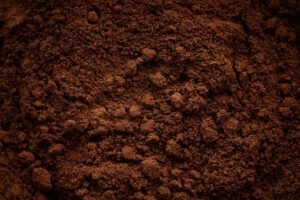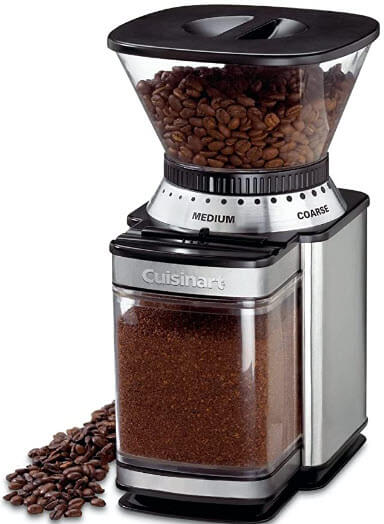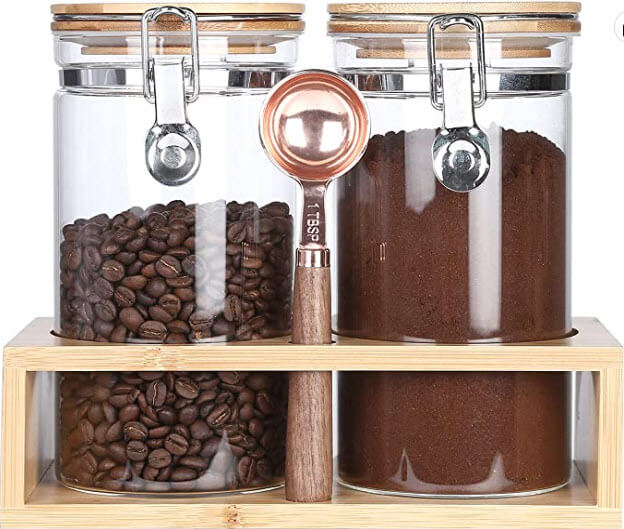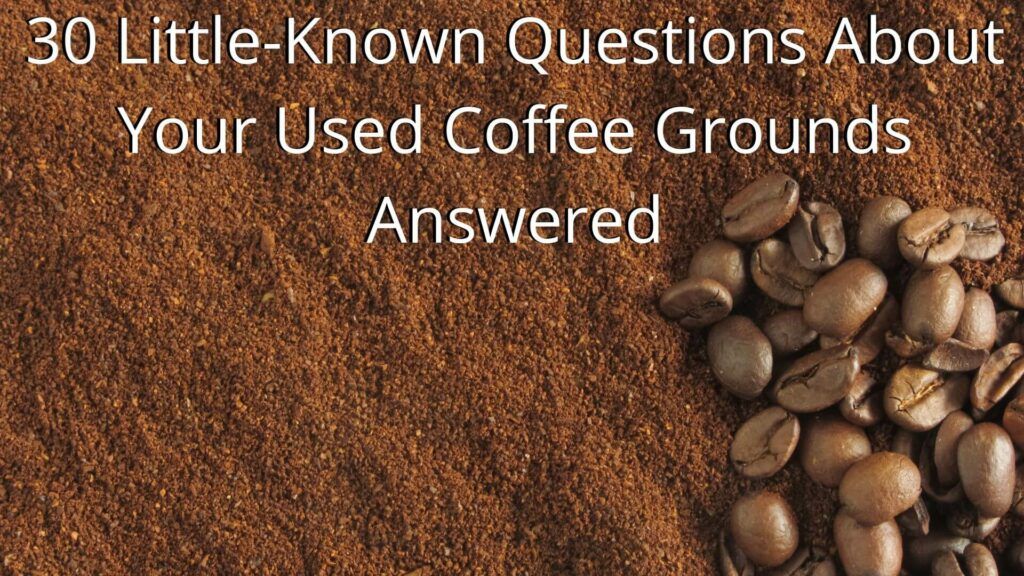Do you prepare your morning coffee the same way each and every time? Do you know what to do with the used coffee grounds once you’re done brewing? If not, don’t worry – we’ve got all the answers for you.
Keep reading to learn 30 interesting facts about used coffee grounds that will make you smarter (and maybe even a little bit more eco-friendly) than before. Let’s get started!
Why You Shouldn’t Use Coffee Grounds?
If you’re like most people, you probably start your day with a cup of coffee. But what do you do with the used coffee grounds? Many people think that they can just throw them out or compost them. However, there are some good reasons why you shouldn’t use coffee grounds in your garden.
For one thing, used coffee grounds contain a lot of caffeine. Caffeine is a natural herbicide, so it can actually kill plants. If you use too much, it can even be toxic to animals. If you’re composting coffee grounds, be sure to mix them in well with other organic matter so that they don’t concentrate in one area.

Coffee grounds also tend to be acidic. This can be good for some plants, but it can also make the soil too acidic for others. If you’re not sure whether your plants would do well with coffee grounds, it’s best to err on the side of caution and avoid using them.
Finally, used coffee grounds can attract pests. Rodents, in particular, are attracted to the smell of coffee. If you have a problem with pests in your garden, it’s best to stay away from used coffee grounds.
So there you have it: three good reasons why you shouldn’t use coffee grounds in your garden. Next time you finish your morning cup of joe, just throw the used grounds in the trash instead of adding them to your compost pile or scattering them around your plants. Your garden will be better off for it.
What Is The Difference Between Coffee And Coffee Grounds?
There are several differences between ground and instant coffee. The main difference is that ground coffee is made from freshly roasted coffee beans while instant coffee is made from pre-ground coffee. This means that ground coffee has a fresher, more robust flavor while instant coffee has a weaker flavor. Ground coffee also contains more caffeine than instant coffee.
If you are looking for a stronger flavored cup of coffee, then you should go with ground coffee. If you are looking for a weaker flavored cup of coffee, then you should go with instant coffee. And if you are looking for a more caffeinated cup of coffee, then you should also go with ground coffee.
What Plants Can I Put Coffee Grounds On?
Your acid-loving plants like hydrangeas, rhododendrons, azaleas, lily of the valley, blueberries, carrots, and radishes will appreciate used coffee grounds. Mix used coffee grounds with the soil before planting.
Coffee grounds contain nitrogen, phosphate, and potassium – as well as other micronutrients that can benefit plants – so they can be used as a fertilizer. Used coffee grounds will release nitrogen slowly, so they can be used as a slow-release fertilizer for your plants.
Composting coffee grounds with other organic materials helps create rich, nutrient-dense compost for your garden.
You can also use coffee grounds to repel pests like slugs and snails from your garden. Just scatter used coffee grounds around the base of your plants. The sharp edges of the coffee grounds will deter pests from entering your garden.
If you have potted plants, used coffee grounds can help drainage and improve aeration in the potting mix. Just add a layer of used coffee grounds to the bottom of your pots before planting.
How Do You Make Coffee Grounds?
Coffee grounds are made from coffee beans that have been roasted, ground, and brewed. The grounds are then dried and used to make coffee. Coffee grounds can be found in many different colors, depending on the type of bean and the roasting process. The color of coffee grounds can range from light brown to dark black. Coffee grounds can also be used to make other products, such as fertilizer and compost.
When it comes to making coffee grounds, there are a few different methods that can be used. One method is to use a coffee grinder. A coffee grinder will grind the beans into a fine powder that can then be used to make coffee. Another method is to use a food processor or blender. This method will grind the beans into a coarse powder. The coarse powder can then be used to make coffee.
Cuisinart supreme grind automatic burr mill
- Optimum Flavor From Your beans
- Grinds Ultra-Fine To Coarse
- 8oz Removable Bean Hopper
- Removable Grind Chamber Holds Enough Coffee For 32 Cups!
- One Touch Grind
- 18 Different Grind Settings
- Fully Automatic
- High Tech Design
- Stainless Steel

Coffee grounds can also be made by brewing coffee. This method is similar to making tea. Coffee grounds are made by steeping coffee beans in hot water. After the beans have been steeped, the water is then filtered and the grounds are collected. The grounds can then be used to make coffee.
No matter what method you use to make coffee grounds, the important thing is to grind the beans into a fine powder. This will help to ensure that your coffee has a rich flavor and aroma. Coffee grounds can be stored in an airtight container and kept in a cool, dry place for up to two weeks.
Do Coffee Grounds Attract Rats?
Coffee grounds neither repel or attract rats. Coffee grounds won’t keep rats away nor will they encourage rats to move into an area. Coffee grounds, like any other food item, may serve as a rat’s food source; but there is no evidence that coffee grounds deter rats from feeding. In fact, some people use coffee grounds as bait in traps to catch rats!
If you’re concerned about rats in your home, the best way to prevent them is to seal up any openings or cracks that they could use to enter your home. Coffee grounds won’t do the trick.
Which Plants Do Not Like Coffee Grounds?
Coffee grounds inhibit the growth of some plants, including geranium, asparagus fern, Chinese mustard and Italian ryegrass. Coffee grounds also discourage pests such as slugs and snails. While coffee grounds may not be the perfect solution for every plant or pest problem, they can be a helpful tool in the garden.
When using coffee grounds as a mulch or fertilizer, it is important to remember that they are acidic. This means that they can lower the pH of your soil.
Coffee grounds should be used sparingly on plants that prefer alkaline conditions, such as hyacinths, lilacs and dogwoods. It is also important to avoid using too much coffee ground, as this can make the soil too acidic for plants.
If you are unsure whether coffee grounds will be beneficial for your plants, it is always best to test the soil before using them. This can be done by mixing a small amount of coffee grounds into the soil and monitoring the plants for any negative effects.
Coffee grounds can be a great addition to your garden, but it is important to use them wisely.
Coffee grounds can also be used to make Compost Tea. This is an effective way to add nutrients and beneficial microorganisms to your plants.
To make Compost Tea, simply steep a few handfuls of coffee grounds in water for 24 hours. The resulting liquid can then be diluted and used as a fertilizer or foliar spray. Compost Tea is a great way to improve the health of your plants without using synthetic chemicals.
Overall, coffee grounds can be a helpful tool in the garden. However, it is important to use them wisely and test the soil before using them on your plants.
Coffee grounds can be beneficial for some plants, but they can also be detrimental to others. When in doubt, it is always best to err on the side of caution.
Can You Drink Coffee Grounds?
Can you drink ground coffee without filtering? The answer is yes, but it might not be the best idea. Coffee grounds are rich in caffeine, which can lead to some side effects if consumed in large quantities.
If you do decide to drink coffee grounds, it’s important to know how much caffeine is in each serving. Too much caffeine can cause jitters, anxiety, and insomnia. It can also aggravate certain medical conditions like heart arrhythmias and gastroesophageal reflux disease (GERD).
It’s best to moderate your intake of coffee grounds and make sure they’re diluted with water or milk before consuming. You should also avoid drinking coffee on an empty stomach, as this can exacerbate the side effects.
So, while you can technically drink coffee grounds, it’s probably not the best idea. If you’re looking for a quick caffeine fix, it’s better to stick to brewed coffee or espresso.
related article in justAnotherCuppaCoffee.com (breville barista)
You can check out our full review on my #1 pick here:
“breville barista review – a coffee machine that can turn anyone into a top barista”


Can I Just Add Hot Water To Ground Coffee?
Can I add hot water to ground coffee? The simplest way to make coffee without a coffee maker is by adding hot water to coffee grounds. If you’re in a rush or don’t have access to a coffee maker, this method will get you your caffeine fix.
To make coffee using this method, start by boiling water. Then, add 2 tablespoons (10 grams) of ground coffee per cup (237 ml) of water. Stir the mixture and let it steep for 3-4 minutes before removing the grounds with a spoon or strainer. Pour the coffee into a mug and enjoy!
If you find that your coffee is too strong or bitter, try adding more hot water to dilute it. You can also experiment with different ratios of coffee to water until you find your perfect brew. Just remember that you’ll need to adjust the amount of time that you let the mixture steep accordingly.
So, if you’re in a bind and need your coffee fix, don’t worry! You can easily make a cup of joe by adding hot water to ground coffee. Just be sure to adjust the ratio of coffee to water to suit your taste.
16 Creative Ways to Use Old Coffee Grounds
1. Coffee grounds can be used as a natural exfoliant. Just mix them with some water to create a paste and massage it into your skin in circular motions. Rinse with warm water afterwards.
2. If you have oily skin, coffee grounds can help absorb excess oil and reduce shine. Just apply a small amount to your face and let it sit for about 5 minutes before rinsing off.
3. Coffee grounds can also be used as a hair treatment. Massage them into your scalp to stimulate blood flow and circulation, which can promote hair growth. You can also rinse your hair with coffee to add shine and boost volume.
4. Coffee grounds can be added to your compost pile to help improve drainage and aeration.
5. Coffee grounds can be used to deter pests like slugs and snails. Just sprinkle them around the perimeter of your garden or wherever you see these pests congregating.
6. Coffee grounds can also be used to fertilize plants. They’re rich in nitrogen and other nutrients that plants need to thrive. Just mix them into the soil around your plants or sprinkle them on top as a mulch.
7. Coffee grounds can be used to deodorize your hands after cooking with garlic or onions. Just rub them on your hands and rinse with water.
8. Coffee grounds can also be used to freshen up musty-smelling rooms or fabrics. Just place a bowl of coffee grounds in the affected area and let it do its work.
9. Coffee grounds can be used to clean greasy surfaces like stovetops and countertops. Just dampen a cloth with some water and add a few spoonfuls of coffee grounds. Rub the surface in circular motions and rinse with water afterwards.
10. Coffee grounds can also be used to clean dirty dishes. Just add a handful to your dishwater along with your regular detergent. The coffee grounds will help break down food stains and grease.
11. Coffee grounds can be used to polish wood furniture. Just mix them with some olive oil or lemon juice to create a paste, then rub it onto the surface in circular motions. Wipe away any excess with a clean cloth.
12. Coffee grounds can also be used to remove stains from clothing. Just rub the coffee grounds into the stain, then wash the item as usual.
13. Coffee grounds can be used to deodorize your fridge or freezer. Just place a bowl of coffee grounds inside and let it work its magic.
14. Coffee grounds can also be used to clean your carpets or rugs. Just sprinkle them over the surface and vacuum them up after a few minutes. The coffee will help absorb any odors and freshen up your home.
15. Coffee grounds can be used to make a facial mask. Just mix them with some water to form a paste, then apply it to your face. Rinse with warm water after 10 minutes.
16. Coffee grounds can also be used as a natural insecticide. Just mix them with water and spray the mixture on your plants. The coffee grounds will repel pests like aphids, whiteflies, a
When Should I Put Coffee Grounds On Plants?
Coffee grounds can be beneficial for plants, but it is important to know when to apply them. Coffee grounds contain nitrogen, which is a key nutrient for plants. They also help improve drainage and aeration in the soil, and can provide a boost of energy for plants that are struggling.
However, coffee grounds can also make the soil too acidic for some plants. It is important to test the pH of the soil before adding coffee grounds, and to only add them in small amounts if the pH is already low. Coffee grounds should also be used sparingly on young plants, as they can stunt their growth.
In general, coffee grounds are best used as a compost or mulch. They can be added to the soil around plants, or used as a top dressing. Coffee grounds can also be brewed into a coffee “tea” and used as a liquid fertilizer.
When using coffee grounds in the garden, it is important to remember that too much of a good thing can be harmful. Too much nitrogen can cause plants to grow too quickly, which can make them weak and susceptible to disease. Coffee grounds should be used in moderation, and only applied to plants that will benefit from them.
Can You Put Coffee Grounds In Potted Plants?
Yes, coffee grounds are beneficial for indoor plants! Coffee grounds provide indoor plants with a number of nutrients that they need to grow, including nitrogen, phosphorus, and potassium. Coffee grounds also help improve drainage and aeration in the soil, and can help reduce compaction. Used coffee grounds can also be used as a mulch to help protect your plants’ roots from extreme temperatures.
How Do I Make Coffee Grounds Without a Coffee Maker?
There are a few ways to make coffee grounds without a coffee maker. One way is to simply grind up coffee beans using a food processor, blender, or coffee grinder.
Another way is to brew a pot of coffee using a French press or other method, and then strain the grounds out.
Finally, you can buy pre-ground coffee that doesn’t require brewing. Whichever method you choose, making your own coffee grounds is easy and convenient!
What Animals Do Coffee Grounds Keep Away?
Coffee grounds are commonly used to keep animals including slugs, snails, rabbits and fire ants from eating plants in the garden, and to keep cats from using gardens as a litter box.
Coffee grounds can also be used to keep away mosquitoes, wasps and bees. When used as a pesticide, coffee grounds are effective in keeping away certain crawling insects including earwigs and cutworms.
Coffee grounds can also help keep animals like deer from eating your plants.
To use coffee grounds as a pest control measure, simply sprinkle them around the area you want to protect. You can also make a pest control spray by mixing equal parts water and coffee grounds, and spraying it on plants that are being eaten by pests. Reapply after rain or every two weeks for best results.
Be sure to keep pets and children away from treated areas until the spray dries completely. Coffee grounds can also be added to your compost pile to help deter pests.
If you have a pest problem, give coffee grounds a try before reaching for toxic chemicals. Coffee grounds are a safe, natural way to keep pests out of your garden and off your plants.
What Bugs Do Used Coffee Grounds Deter?
Most bugs have a very strong sense of smell. Coffee grounds contain compounds that are aromatic to humans but repellent to many insects, including mosquitoes, ants and flies.
Used coffee grounds can be placed in a small dish or saucer and set near the area where bugs are present. The Coffee grounds will absorb odors from the air, including smells that attract bugs. Coffee grounds can also be sprinkled around the perimeter of your home to keep bugs away.
Can Eating Coffee Grounds Help You Lose Weight?
If you’re looking for a way to help boost your weight loss efforts, you may be wondering if eating coffee grounds can actually help. Coffee grounds have been touted as a potential weight loss aid for years, but does the science back it up?
There is some evidence to suggest that coffee grounds can indeed help with weight loss. One study found that rats who were fed coffee grounds lost more weight than those who were not. Another study found that coffee grounds may help increase the amount of fat that is burned during exercise.
So, while there is still more research needed on the topic, it seems that consuming coffee grounds could potentially help you lose weight.
Caffeine can boost the metabolic rate and increase fat burning. Coffee grounds contain more caffeine than regular coffee, so they may have even more of a weight loss effect.
In addition to their weight loss potential, coffee grounds offer other health benefits as well. Coffee grounds are a source of antioxidants and can help protect against disease. They may also help improve digestive health and reduce inflammation.
If you’re interested in trying coffee grounds for weight loss, they are readily available at most grocery stores. You can add them to smoothies or baked goods, or simply eat them straight up. Just be sure to start with a small amount to see how your body reacts. Coffee grounds are safe for most people but can cause stomach upset in some.
So, if you’re looking for a new weight loss strategy, coffee grounds may be worth a try. Just be sure to consult with your doctor first to make sure they are safe for you.
How Much Caffeine Is In Used Coffee Grounds?
Do you love coffee but hate the jitters? Used coffee grounds may be the perfect solution! Coffee grounds contain less caffeine than fresh beans, so you can enjoy all the flavor without the side effects.
Brewing coffee with used grounds is also a great way to recycle! Coffee grounds can be used as fertilizer or even added to your compost pile. So why not save those used grounds and put them to good use?
So how much caffeine is in used coffee grounds? Depending on the type of bean and brewing method, used coffee grounds can contain anywhere from 2-5% of the caffeine found in fresh beans.
This means a cup of brewed coffee made with used grounds will have about 20-50mg of caffeine, compared to the 100-200mg in a cup of fresh brewed coffee.
So if you’re looking to cut down on your caffeine intake, switching to used coffee grounds may be the way to go. And brewing with used grounds is a great way to be eco-friendly and reduce your waste!
How Long Are Coffee Grounds Good For?
If unopened, coffee grounds last around five months past their roast date. Once opened, coffee grounds are good for one to two weeks. Coffee grounds should be stored in an airtight container in a cool, dry place.
KKC air tight coffee storage sealed glass containers
- 2 X 40 Fluid Oz Sealed Air Tight Jars
- Ornate Bamboo Shelf
- Serving Spoon
- Perfect For Storing Ground or Whole Bean Coffee & Looks Great In Any Kitchen

When properly stored, coffee grounds can be used well past their expiration date. Coffee grounds can last up to six months in the freezer and still retain their flavor. However, the quality of the flavor will decline the longer the coffee grounds are stored.
Coffee grounds can be used for more than just brewing coffee. They can also be used as a facial scrub, fertilizer, or even as a pest repellent. Just make sure to store them properly so they don’t go bad.
Coffee grounds can last a long time if they are stored properly. However, the quality of the flavor will decline over time. If you want to maximize the flavor of your coffee grounds, it is best to use them within one to two weeks of opening them.
Do Coffee Grounds Repel Spiders?
It is a common belief that coffee grounds can be used to repel spiders. But do they actually work?
There are a few things to consider when it comes to using coffee grounds as a repellent. For one, it is important to remember that not all spiders are the same.
Some spiders are more attracted to Coffee Grounds than others. Additionally, Coffee Grounds may only repel spiders for a short period of time before they become accustomed to the scent.
That being said, there are many people who swear by using Coffee Grounds as a spider repellent. If you decide to try it, we recommend using used coffee grounds, as they will be more potent.
Simply sprinkle the coffee grounds around areas where you have seen spiders or where you think they may enter your home.
According to the EPA, coffee grounds are most potent when they are burned.
Overall, coffee grounds may or may not work as a spider repellent. But it is definitely worth a try!
Do you have any tips for keeping spiders away? Share them with us in the comments below!
Can I Mix Coffee Grounds With Potting Soil?
The best way to use coffee grounds for plants is adding it to your compost pile, and then mixing a little bit of that compost in with your potting soil when you’re ready to plant. Coffee grounds contain nitrogen, phosphorus, and potassium – all essential nutrients for plants – so they can be a great addition to your garden.
If you don’t have a compost pile, you can still mix coffee grounds into your potting soil, but you’ll need to be careful not to add too much. Coffee grounds are acidic, so they can lower the pH of your soil and make it difficult for plants to absorb nutrients. Add a little at a time and test the pH of your soil before adding any more.
In general, it’s best to err on the side of caution when adding coffee grounds to your garden. A little bit can go a long way!
How Long Does It Take Coffee Grounds To Decompose?
Coffee grounds can take three months or more to break down fully in a compost pile. Coffee grounds release nitrogen as they decompose, which is an important nutrient for plants.
However, coffee grounds can also be a source of mold if not managed properly. Coffee grounds can be added to compost piles or used as mulch around plants.
While coffee grounds take time to decompose, they can be a great addition to a compost pile.
Can Coffee Grounds Keep Ants Away?
Coffee grounds can be used to keep ants away. The coffee grounds repel the ants and prevent them from coming into your home.
To use coffee grounds to keep ants away, simply sprinkle the grounds around the perimeter of your home. You can also put the grounds in a line leading up to your door to keep ants from entering your home.
Coffee grounds can also be placed in areas where ants are seen. The coffee grounds will repel the ants and they will eventually go away.
If you have an ant problem, try using coffee grounds to get rid of them. Coffee grounds are a natural and effective way to keep ants away.
Do Coffee Grounds Keep Squirrels Away?
Coffee grounds will keep squirrels away from your garden because they do not like the smell. You can use fresh or used coffee grounds. Simply sprinkle the coffee grounds around the perimeter of your garden or wherever you have seen squirrels digging. Coffee grounds are a natural and effective way to repel squirrels without harming them.
Can You Reuse Coffee Grounds For More Coffee?
Unfortunately, I do not recommend using coffee grounds to brew more than one cup of coffee. Coffee grounds can be used to brew a second cup of coffee, but the resulting coffee will be noticeably weaker and more watery.
The reason for this is that the coffee grounds have already been extracted during the first brewing, so they don’t contain as much flavor when reused.
If you want to make a stronger cup of coffee, I recommend using fresh coffee grounds. This will give you the best flavor and results.
However, if you’re in a pinch and need to reuse your coffee grounds, go ahead and give it a try! Just know that the flavor won’t be as great as it could be.
Does Burning Coffee Grounds Repel Mosquitoes?
Not only do they repel mosquitoes, but also other insects such as wasps and bees. Coffee grounds contain compounds that are toxic to mosquitoes, so when they sense the presence of these chemicals, they will fly away.
You can use coffee grounds in two ways to repel mosquitoes: by burning them or by scattering them around your home.
If you choose to burn coffee grounds, be sure to do so safely. Make sure the area is well-ventilated and never leave the fire unattended. Coffee grounds can also be added to candles for a natural mosquito repellent.
Scattering coffee grounds around your home is also an effective way to keep mosquitoes away. Simply sprinkle used coffee grounds in areas where you’ve seen mosquitoes or in places where they tend to congregate, such as near standing water.
You can also make a mosquito repellent spray using coffee grounds. Simply steep grounds in boiling water for 5 minutes, then strain the mixture. Add this solution to a spray bottle and use it as you would any other insect repellent.
Coffee grounds are an effective, natural way to repel mosquitoes. So if you have a problem with these pesky insects, give this method a try!
Can I Sprinkle Used Coffee Grounds On My Lawn?
Using coffee grounds as lawn fertilizer is also good for the worms. They love coffee almost as much as we do. Coffee grounds have a high nitrogen content, which is one of the three main nutrients that lawns need. Coffee grounds also improve soil drainage and aeration while helping to control weeds.
Applying coffee grounds to your lawn is as easy as spreading them around like you would any other type of fertilizer. You can also add used coffee grounds to your compost pile. Coffee grounds make a great addition to any compost, as they are rich in nitrogen. Just be sure to mix them in well, as too much nitrogen can cause problems for plants.
If you have a lot of coffee grounds, you can make a slurry out of them by mixing them with water. This can be sprayed on your lawn or used as a watering can. Coffee grounds are also great for mulching around plants. Just spread a layer of coffee grounds around the base of your plants, and they will help to keep the weeds at bay while keeping the soil moist.
So, if you have some used coffee grounds, don’t throw them away! Spread them on your lawn or add them to your compost pile. Your lawn will thank you for it!
Can Coffee Grounds Go Down The Sink?
Unlike most foods, coffee grounds clump together in water rather than breaking down. Coffee grounds can quickly fill up your pipes and cause blockages. Coffee grounds are also difficult to filter out of water, which means they can end up in your septic tank or sewage system and cause problems there as well.
If you have a garbage disposal, you may be tempted to grind up coffee grounds in it. However, used coffee grounds can actually clog up your garbage disposal. Coffee grounds are abrasive and can damage the blades of your garbage disposal over time. Additionally, the oils in coffee grounds can create a sticky mess that’s difficult to clean.
So what should you do with used coffee grounds? The best option is to compost them. Coffee grounds are rich in nutrients that can benefit your plants. If you don’t have a compost bin, you can also throw used coffee grounds in the trash.
Do Coffee Grounds Attract Flies?
Do coffee grounds attract flies? This is a common question among coffee lovers, as used coffee grounds can often be found in (and around) the kitchen.
There are a few reasons why coffee grounds may attract flies. First, coffee grounds emit a strong smell that can attract various insects. Additionally, the sugar in coffee grounds can also be appealing to some insects. Finally, the moisture in used coffee grounds can provide a perfect breeding ground for certain types of flies.
If you’re concerned about flies being attracted to your coffee grounds, there are a few things you can do to help deter them. First, make sure to store your coffee grounds in a sealed container. Additionally, you can simply throw out your used coffee grounds on a regular basis to prevent them from becoming a breeding ground for flies.
Do Cats Like Coffee Grounds?
If you want to keep your own kitty or somebody else’s from snooping around your yard, you can easily do that by sprinkling some used coffee grounds around the perimeter. Coffee grounds contain caffeine which is a natural stimulant and will keep cats away. So if you have a problem with strays pooping in your garden or scratching up your furniture, try using coffee grounds as a deterrent.
Do Coffee Grounds Clean Pipes?
Unfortunately, coffee grounds do not break down in water and can actually clog your pipes. Coffee grounds can build up over time, causing a blockage. If you notice your drains are slow or water is backing up, it’s likely due to coffee grounds. The best way to avoid a clogged drain is to dispose of coffee grounds in the trash.
Coffee grounds may seem like an easy and convenient way to clean your pipes, but it’s not worth the risk of damaging your plumbing. Stick to traditional methods like plunging or using a drain snake to clear any clogs. If you have any doubts, it’s always best to call a professional plumber.
Why Can’t You Put Coffee Grounds In a Garbage Disposal?
Coffee grounds can clog your garbage disposal and cause it to break. Coffee grounds are also difficult to grind up, so they can end up making your disposal smell bad. If you must dispose of coffee grounds, make sure to do it in the trash can and not the sink.
Coffee Grounds Conclusion
So, there you have it. A few ideas of things to do with used coffee grounds other than composting them (though that’s a great option, too). If you have any questions about using coffee grounds or want some advice on how to best implement these tips in your own life, let us know.
We love talking about all things coffee!



